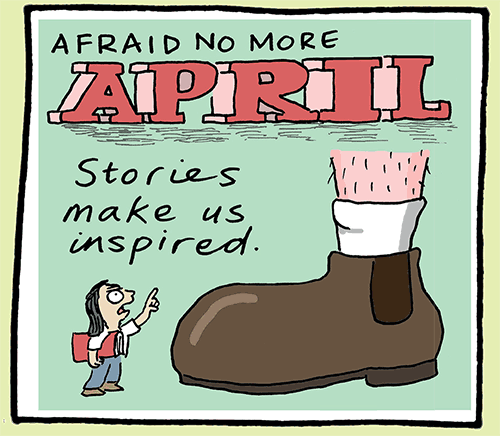
Afraid-No-More April:
Stories Make Us Inspired

The laureate calendar tells us this is Afraid No More April.
I’m thinking I might have overstated that a bit. Perhaps Afraid A Bit Less Now I’ve Got Some Help And A Workable Problem-Solving Strategy April might be more appropriate.
Because fear is not always a bad thing, even in stories. Yes it can scramble our brains and reduce our limbs to lasagne and our resolve to risotto. But it can also spur a young character grappling with big threatening problems to new levels of determination and creative thinking.
That’s always how I hope it’ll be for my characters. And it usually is. Jamal saving his sister from a landmine in Boy Overboard, for example. Limpy’s brave attempts to dissuade humans from driving over cane toads in Toad Rage. Aristotle’s equally impressive decision, in Aristotle’s Nostril, not to run and hide when he discovers there’s another nostril next door. And of course Felix’s frequently-renewed resolve in the Once series to keep friendship alive, along with his optimism and hope, despite being surrounded by the most murderous adult behaviour.
We all deal with our own fears in our own ways, but I know from personal experience as a reader and a writer that sharing the fears of characters we care about, and going deep inside them to find an antidote, does leave us better equipped to deal with our own unexpected nostrils.
Kids’ stories are about small people facing big problems - problems often caused by grown-ups behaving badly. It takes special qualities to stand up to someone bigger and more powerful. We might tell ourselves such bravery only happens in stories, but who knows what might happen in our own lives if we’re inspired often enough by our reading?
Here’s a simple group writing exercise to explore this idea bit further.
Start with a discussion, giving everyone the chance to talk about a fearful experience they’ve had. Then invite each person to write a very short story in which they or a character try ways to solve or survive the problem that’s causing the fear. Perhaps three or four different attempts, all with different outcomes. And then ask those who’ve been sufficiently inspired by the first-hand experience of fear-management strategies to take a deep breath and read their stories to the group.
Happy reading and writing, discussing and sharing (bravely),

